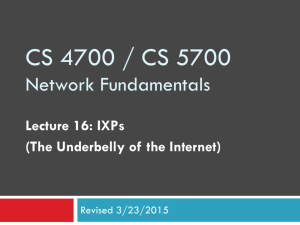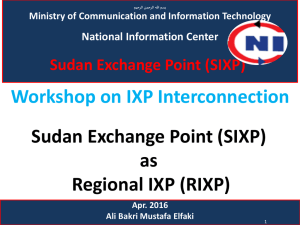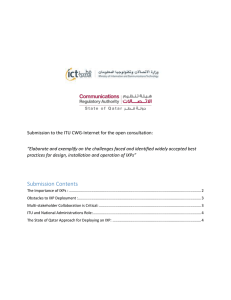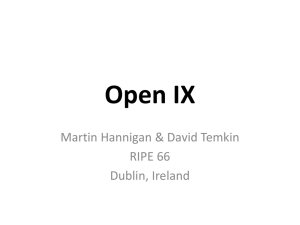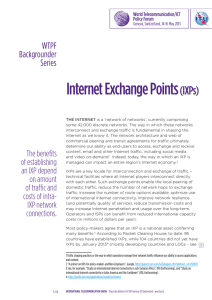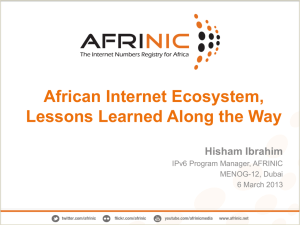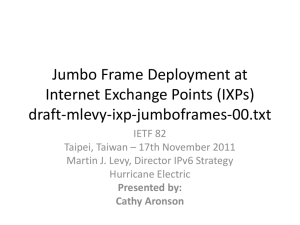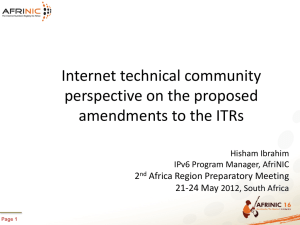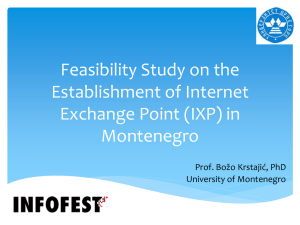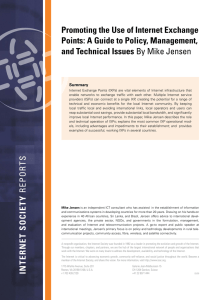THE INTERNET IS FOR EVERYONE and benefitting people around the globe.
advertisement
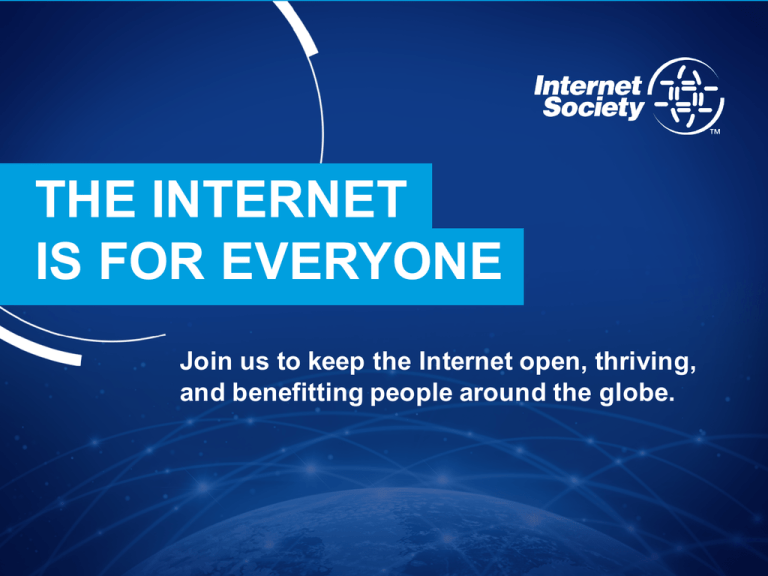
THE INTERNET IS FOR EVERYONE Join us to keep the Internet open, thriving, and benefitting people around the globe. Workshop on the Development of IXPs in the Arab Region, April 5-6 2 International IXP Development | Associations & Forums An Internet Exchange Point (IXP) is a network facility that enables the interconnection of more than two independent Autonomous Systems, primarily for the purpose of facilitating the exchange of Internet traffic v IX-Federation | http://www.ix-f.net/ IXP Best Practices and Best Current Operational Practices https://www.euro-ix.net/ixps/set-up-ixp/ixp-bcops/ IGF IXP Best Practices | http://ow.ly/YYTFZ 3 The Internet Society IXPs - Some Observations • Peering enables ISPs to saves costs from delays in upgrade of International transit capacity, despite addition of new users on the network. • The transit vs. peering ratio impacts an ISPs bottom line. ISPs that peer more realize higher cost savings. • A network can have fewer users with fast Internet access and require the same transit/peering capacity as a network with more users on slow Internet access • High profit margins favor ISPs that have large bandwidth (Transit+ peering) capacity • To realize significant profit margins, ISPs need to peer at least 50% of their transit capacity • Transit usage/demand will continue to grow even after the ratios change in favor of peering traffic. The Internet Society Internet Ecosystem – Impact | IXPs • Internet Community Multiplier Effect • Internet & Fibre Infrastructure Development • Local technical community development & strengthening • Train the trainer • Network Operator Group (NOG) Development • Mentoring Opportunities • Economic Development & Investment | Additional Sustainable Infrastructure Projects • Bottom-up Governance & Amplifier Across Local Ecosystem The Internet Society Challenges - IXPs Collaboration and building trust. The establishment of an IXP requires the collaboration of many actors, many of whom are competitors that will be exchanging traffic at the IXP. Neutral location and management. Best practices have shown that IXP location and management should be as neutral as possible and agreed upon by all IXP participants. Ideally, the location of an IXP and an IXP manager/operator should be independent of outside commercial or governmental influences. Unfortunately, some incumbents and/or governments want to control all aspects of an IXP. When this happens, the IXP often fails, as confidence and trust in its management and operations is lost. Enabling environment. IXPs are sensitive to local constraints associated with the lack of an enabling Internet-connectivity environment, including investment and tax constraints, the high cost of local terrestrial fibre, and complicated rules for network deployment. The Internet Society Best Practices - IXPs Guiding Principles Government actors can play an active and critical role in championing the development of IXPs and removing roadblocks to their growth and success. Guiding principles for policy makers and regulators include: • Support IXPs and speed their development with information and communications technology (ICT) policy objectives that promote an enabling environment for interconnection via policy and regulatory frameworks. • Provide as much policy and regulatory transparency as possible to encourage regional and international entities to participate in the local interconnection and peering environment. • Encourage competitive access to wired and wireless connections, which will help lower the costs associated with connecting to an IXP. The Internet Society Best Practices - IXPs Guiding Principles • Promote local investment opportunities via tax holidays, and reduced duties on the equipment needed to build IXPs and operator networks (e.g., switches, routers, and servers). Provide clear guidance about local business rules and practices. • Foster relationships with IXPs to learn more about local interconnection environments and the sustainability and technical management of an IXP. • Work with existing IXPs and expert organizations to avoid the mistakes that other IXPs have made, obtain start-up assistance and equipment donations, and learn more about training and human-capacity development opportunities. • Refer to the Internet Society online Interconnection information for a general set of guiding principles that enhance overall network interconnectivity (http://www.internetsociety.org) and our report on Lifting barriers to Internet development in Africa: suggestions for improving connectivity: http://www.internetsociety.org/doc/lifting-barriers-internet-development-africasuggestions-improving-connectivity/ The Internet Society Best Practices - IXPs Below are best practices from some of the practical work we have done with partners around the world: • Local Champion(s): A champion is needed to help develop the IXP and build a community. • Neutrality: As noted above, a neutral location and management of the IXP is critical to sustainability. All organizations at the IXP should agree on location and IXP management. • Simple Management Structure: Many very large IXPs have been established on a basis of a simple management structure, a governing board made up largely of customers, and a volunteer staff, with customer fees set to just cover costs (‘not-for-profit’). • Equal Partners: All peers at an IXP should be treated equally. Founding partners should not vote in or out members or have a weighted vote. • Establish Operating Principles: Establish operating principles and publish them. • Website: It is critical to have a web-site that includes, at a minimum, basic location and contact information, peering policies, traffic statistics, peers at the IXP. The Internet Society Best Practices - IXPs Below are best practices from some of the practical work we have done with partners around the world: Redundant Power Supply: Always have a redundant power supply and test switching over to it frequently. Fibre to the IXP: Allow operators to bring their fibre to the IXP Redundant POP: Establish a redundant Point of Presence (POP). Numbering Resources: Work with your regional Internet registry (RIR) to obtain IP addresses for peering and IXP management, and obtain and ASN from the RIR. Host Value-added Services: Host value-added services to increase the value of the IXP for peers (i.e., time servers, root server instances, CDN caches). Staffing: Some IXPs function with volunteers. Others have part-time or permanent staff. Take a look at models that may work for you, recognizing your staffing may shift as the IXP grows. Diverse players: Allow diversity at your IXP -- banks, regional and international operators, content delivery networks, research and education networks, cloud-service providers (gaming, social media), and government networks. The Internet Society Thank you for your attention! Jane Coffin, Director, Development Strategy coffin@isoc.org The Internet Society | www.internetsociety.org www.internetsociety.org Additional IXP Resources Internet Society: Internet exchange point (IXP) Information Web page, http://www.internetsociety.org/what-we-do/issues/internet-exchangepoints-ixps . The Internet exchange Point (IXP) Toolkit and Best Practices Guide, http://www.internetsociety.org/ixptoolkitguide and http://www.ixptoolkit.org . Promoting the Use of Internet Exchange Points: A Guide to Policy, Management, and Technical Issues, by Mike Jensen, http://www.isoc.org/educpillar/resources/docs/promote-ixp-guide.pdf Assessment of the Impact of Internet Exchange Points (IXPs): Empirical Study of Kenya and Nigeria, http://www.internetsociety.org/ixpimpact . Connectivity in Latin America and the Caribbean: The Role of Internet Exchange Points, http://www.internetsociety.org/sites/default/files/rptLACIXPvrt-201311-eng_0_0.pdf The Internet Society Additional IXP Resources Lifting barriers to Internet development in Africa: suggestions for improving connectivity, http://www.internetsociety.org/doc/liftingbarriers-internet-development-africa-suggestions-improvingconnectivity/ Euro-IX Best Current Operational Practices, https://www.euro-ix.net/ixps/set-up-ixp/ixp-bcops/ Report from the IGF Rio Best Practices Session Internet Traffic Exchange in Less Developed Internet Markets and the Role of Internet Exchange Points, http://www.isoc.org/educpillar/resources/docs/igfixp-report-2007.pdf Towards Efficiencies in Canadian Internet Traffic Exchange, http://cira.ca/sites/default/files/attachments/publications/towardefficiencies-in-canadian-internet-traffic-exchange.pdf OECD’s report on Internet Traffic Exchange, http://www.oecd-ilibrary.org/science-and-technology/internet-trafficexchange_5k918gpt130q-en The Internet Society
